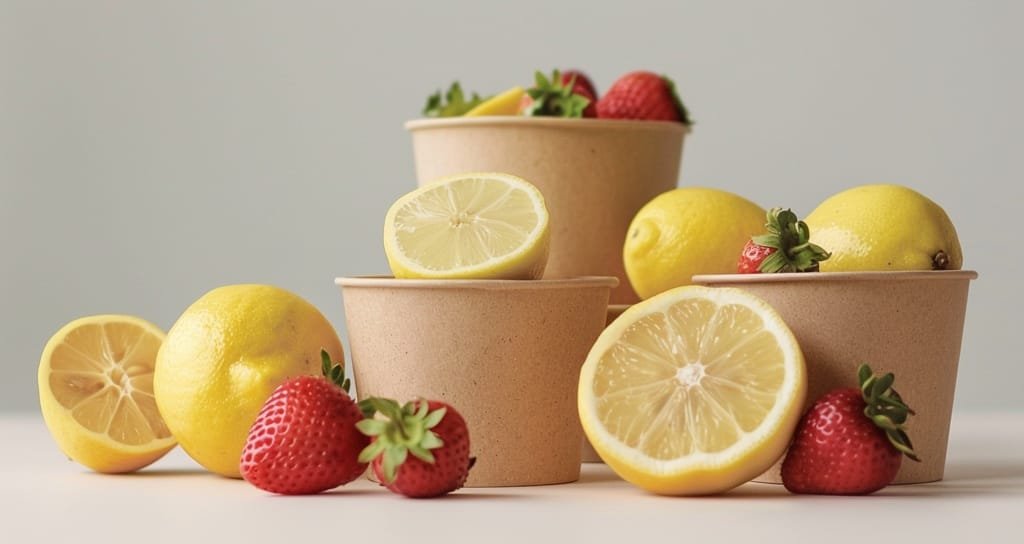Sustainable Produce Packaging
The produce aisle is a testament to nature's bounty, but the packaging that cradles these vibrant fruits and vegetables tells a less optimistic story.
Plastic waste is choking our ecosystems, and consumers are demanding change. Fortunately, the produce industry is rising to the challenge, embracing innovative packaging solutions that prioritize both freshness and sustainability.
This guide explores the urgency of the issue, the exciting advancements in sustainable produce packaging, and why partnering with a company like Kanbol is key to leading this green revolution.
The Environmental Impact of Traditional Produce Packaging
Let's face it: traditional produce packaging is a huge contributor to our global waste problem. In the U.S. alone, millions of tons of plastic packaging end up in landfills or pollute our oceans each year.
While plastics are undeniably convenient and protective, their environmental toll is becoming impossible to ignore.
Moreover, traditional packaging materials like styrofoam pose their own environmental hazards, releasing harmful chemicals and taking centuries to decompose.
The Rise of Sustainable Alternatives
The demand for eco-conscious packaging has sparked remarkable innovations in the produce industry. While each approach has its merits, here's a closer look at the options:
Plant-based bioplastics
Bioplastics derived from renewable resources like cornstarch or sugarcane offer a promising alternative to traditional plastics. They often provide the versatility and functionality needed for fresh produce, with the added benefit of a reduced carbon footprint.
Paperboard and cardboard
Paperboard and cardboard remain important players in sustainable packaging due to their recyclability. However, it's crucial to source these materials responsibly to minimize deforestation. Innovations in grass cardboard and agricultural waste cardboard help address this by using alternative fibers.
Kanbol's Corn-Based Breakthrough
Kanbol leads the way with its unique corn-based molded fiber containers. By using corn stover, an agricultural byproduct, they create durable and fully compostable packaging. This solution not only reduces waste but also creates value from resources that might otherwise go unused.
Contact us to learn how our corn-based packaging can benefit your business.
Benefits of Sustainable Produce Packaging
Embracing sustainable packaging isn't just about feeling good – it offers tangible benefits for businesses, consumers, and the planet. Here's why transitioning to greener packaging matters:
A Healthier Planet:
Sustainable packaging greatly reduces waste sent to landfills and lessens the harmful impact of plastic pollution on ecosystems. Biodegradable and compostable materials break down naturally, contributing to a healthier environment.
Winning Over Consumers:
Today's shoppers are eco-conscious and actively seek brands aligned with their values. Sustainable packaging demonstrates your commitment to the environment, boosting brand reputation and customer loyalty.
Long-Term Cost Savings:
While some sustainable materials may initially have a slightly higher cost, factors like lower waste disposal fees, lightweight shipping advantages, and increased consumer appeal can lead to significant long-term savings.
A Competitive Edge:
Demonstrating your commitment to sustainability can set you apart in the marketplace. It signals to customers and potential partners that you are a forward-thinking, responsible company.
Challenges and Considerations
The switch to sustainable produce packaging isn't without its complexities. Here are some key factors to consider:
Balancing Performance and Sustainability: Sustainable materials need to match the practical requirements of produce packaging. Ensuring food safety, maintaining freshness during transport, and meeting specific moisture or temperature needs is crucial alongside any 'green' benefits.
Costs and Availability: While the landscape is shifting, some sustainable options may still have a higher upfront cost compared to traditional counterparts. Additionally, the availability of certain materials can vary depending on factors like your location and the scale of your business.
Consumer Education: For compostable or less familiar materials, educating consumers on proper disposal is essential. Clear labeling and easy-to-understand instructions can help prevent contamination of recycling streams and maximize the environmental benefits.
Kanbol understands these challenges. Our experts work with you to find the perfect balance of sustainability, performance, and cost-effectiveness for your produce packaging needs. Contact us to learn more.
The Future of Sustainable Produce Packaging
The shift towards sustainable produce packaging is just beginning, and the future looks incredibly promising. Here's what to expect:
Relentless Innovation: Research and development are constantly pushing boundaries. Expect new materials with enhanced properties, improved compostability, and innovative designs that maximize efficiency and minimize waste.
Evolving Regulations: Governments worldwide are incentivizing sustainable packaging and implementing stricter regulations on single-use plastics. Staying ahead of these changes positions your business as an industry leader.
A Greener Industry Standard: As consumer demand and technological advancements continue, sustainable packaging will transition from a niche solution to the expected norm. Early adopters will gain a significant competitive advantage.
Your Sustainability Journey Starts Here
The transition to sustainable produce packaging represents a crucial step in addressing the environmental challenges of our time. This evolution benefits not only the planet but also businesses that embrace it. By choosing eco-friendly options, you safeguard the future, enhance your brand image, and resonate with consumers who demand environmentally conscious practices.
The time to act is now. Here's how you can join the green packaging revolution:
Explore your options: Investigate the wide range of sustainable materials and packaging designs available.
Partner with experts: Collaborate with companies like Kanbol, who specialize in innovative and responsible packaging solutions.
Advocate for change: Support policies and initiatives that promote sustainability within the produce industry.
Together, we can create a future where fresh produce comes packaged in ways that protect both the planet and its precious resources. Let's make sustainable produce packaging the standard, not the exception.
Contact Kanbol today to start your sustainability journey and discover the power of eco-friendly produce packaging.




